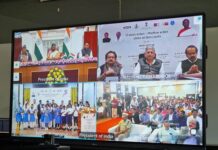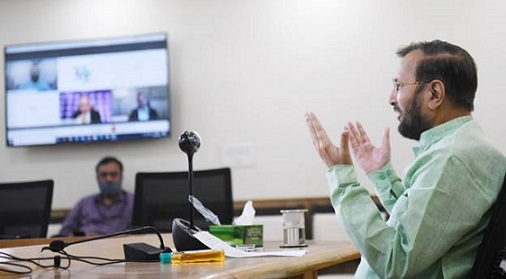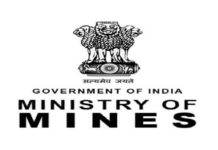By Our Correspondent
NEW DELHI: Environment, Forest and Climate Change Minister Prakash Javadekar has said, Indian Government is committed to reduce the carbon emissions. Addressing the special session on Action Agenda for Sustainable and Self Reliant India during the 15th Sustainability Summit 2020 in New Delhi, He expressed hope that India will achieve the target of reducing carbon emissions by 35 percent in the next ten years. The Minister said, country’s solar power capacity has been increasing rapidly and noted that 68 countries have ratified the International Solar Alliance Agreement.
Talking about AatmaNirbhar Bharat programme of the Government launched by Prime Minister, Narendra Modi to make India self-reliant, the Minister said, Aatmanirbharta is not cutting away from the world, it is more about engaging with the world. Innovation and research become the key. “The thrust is being given on innovation and research and efforts are being made to reduce imports and increase the exports.” He said, India should become a leader in innovations and start owning innovations as research and innovation is the key to take the country to next level in terms of development in the next decade or so.
The Environment Minister stated that it is important to achieve a green earth with clean air and blue skies, post COVID-19 despite the odds and that it is possible to do so, alongside industrial activity. He stated that India has only 2.5 % of world’s land, 4% of freshwater resources and around 20% of world population but still has 8% of the world’s biodiversity because in the Indian culture, flora and fauna are part of life.The Minister pitched for promoting sustainability as it can only save the humankind from worst nature fury. He appealed to the different nations to present their case studies in terms of promoting sustainability.
Highlighting the country’s achievement towards a greener growth in the past few years the Minister said, “India is walking the talk on climate change. Our work on Ujjwala, E Vehicles, BS-VI Engines, Biofuels, Clean air, and Disaster resilience pave the way for a sustainable and resilient India. Targeting 35% emission reduction, we have reached 21% and in 10 years, we will achieve the required 220 GW renewable power targets, of which a total of 87 GW including solar and wind has been achieved”, he said. He further elaborated that our energy mix in the installed capacity now includes 37% of renewable energy sources.
Speaking on compassionate capitalism for an Atmanirbhar Bharat, Sanjiv Puri, Chairman, Advisory Council, CII-ITC Centre of Excellence for Sustainable Development and Chairman and Managing Director, ITC Limited, said that sustainability strategies are integral to the business. Chandrajit Banerjee, Director General, Confederation of Indian Industry, emphasised on the role of inclusive recovery for a self-reliant and sustainable India.
The Sustainability Summit is the annual flagship event of Confederation of Indian Industry in sustainability, launched in 2006 to raise the bar of dialogue, practice and performance of sustainable business. The ‘15th Sustainability Summit – Action Agenda for the Next Decade’ is designed to focus on shaping up of the coming decade, incorporating learning from COVID-19 and reflecting how the drivers of innovation, technology and systems thinking can help us build a more sustainable next decade.






























